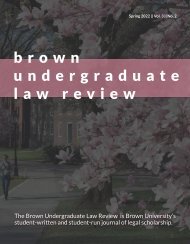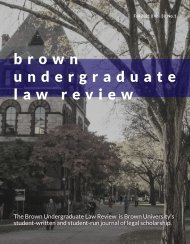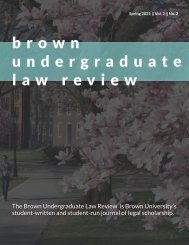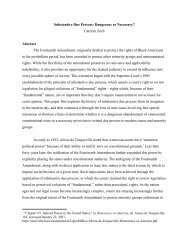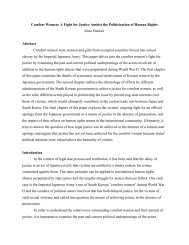From Frontiero to the Air Force: Citizenship and Equal Protection in U.S. Reproduction Jurisprudence
Olivia Siemens '21
Olivia Siemens '21
You also want an ePaper? Increase the reach of your titles
YUMPU automatically turns print PDFs into web optimized ePapers that Google loves.
independent economic, political, and societal ambitions. This case was not Roe v. Wade. It was
Frontiero v. Richardson.
In 1969, Lieutenant Sharron Frontiero, a 23-year-old Air Force officer, sought and was
denied military spousal benefits for her dependent husband. Had Frontiero been a man, these
spousal benefits would have been granted automatically. Because she was a woman, she was
required to prove that her husband was dependent on her for over one-half of their joint income.
When her application was rejected, Frontiero filed a lawsuit against the federal government,
arguing that her rights under the Fifth Amendment’s Due Process Clause had been violated by
this discriminatory dependency standard. A three-judge panel in the Middle District of Alabama
first sided with the government to uphold the standard on rational review grounds. 1 In an 8–1
decision, the Supreme Court reversed, holding that the government’s dependency standard
exerted an unconstitutional burden on Frontiero’s political and economic liberty.
Writing for the majority, Justice William Brennan argues that the law’s invidious
assumptions about sex differences amounted to discrimination “so unjustifiable as to be violative
of due process.” Operating under the auspices of so-called “romantic paternalism”—a set of
cultural and legal attitudes which had historically justified the arbitrary preference of men over
women—Brennan writes that discriminatory laws had served to “put women not on a pedestal,
but in a cage.” A person’s sex “frequently bears no relation to ability to perform or contribute to
society,” he continues, and as such, “statutory distinctions between the sexes often have the
effect of invidiously relegating the entire class of females to inferior legal status without regard
to the actual capabilities of its individual members.” 2
The Court’s ruling in Frontiero established a novel legal basis for future generations of
jurisprudence aimed at outlawing pervasive sex discrimination. It prohibited the conflation of
gender with inherent ability, and it rejected the premise that an entire classification of persons
might be stereotyped as ineligible for full constitutional standing. Finally, it grounded these
ideals not only in the Fourteenth Amendment’s expanded Equal Protection Clause but also in the
procedural protections required by the original Bill of Rights.
1
“Rational basis review” is the least onerous standard of judicial review. It requires only that a statute or ordinance
serves a “legitimate state interest” and that there be a “rational connection” between the statute’s/ordinance’s
“means and goals.” See: “Rational Basis Test,” Cornell Legal Information Institute,
https://www.law.cornell.edu/wex/rational_basis_test.
2
Frontiero v. Richardson, 411 U.S. 677 (1973).
2




